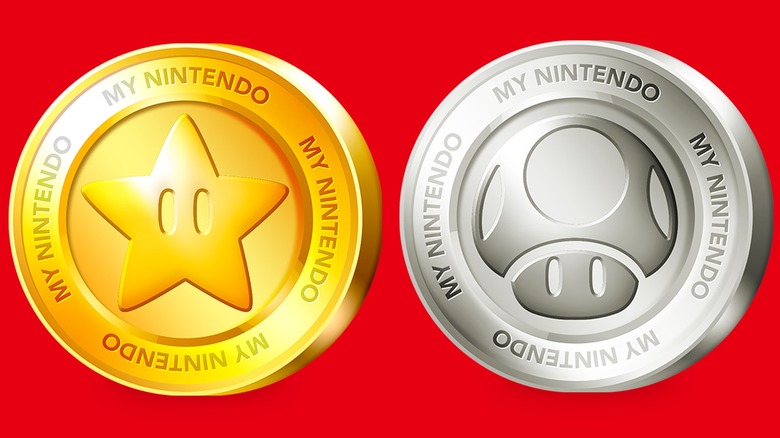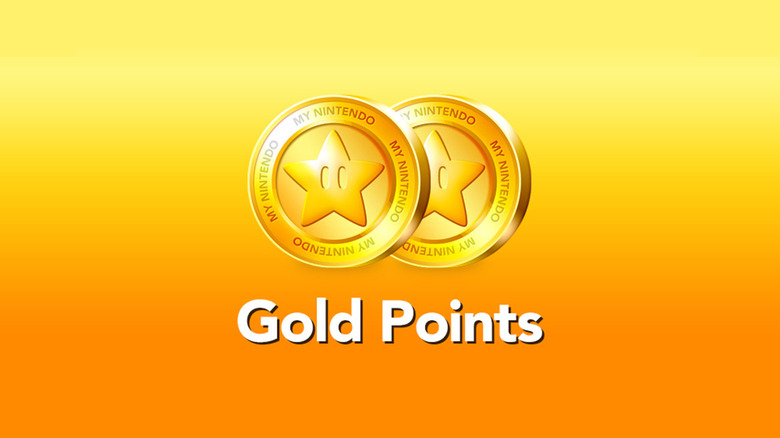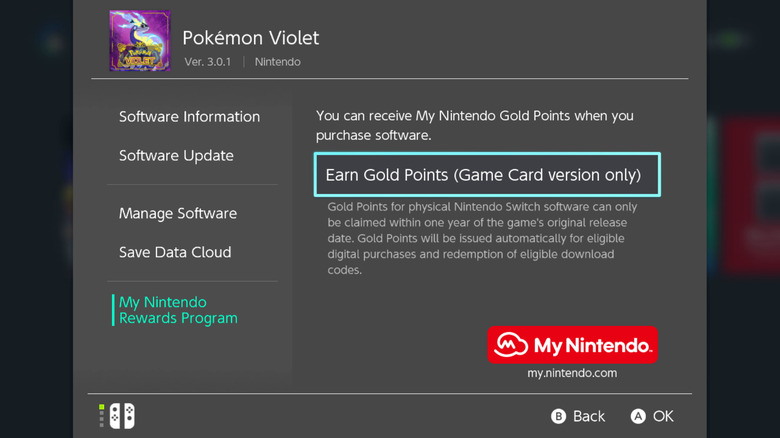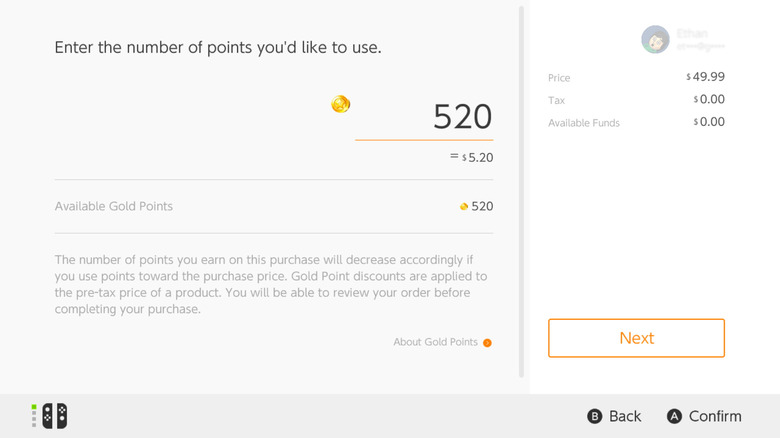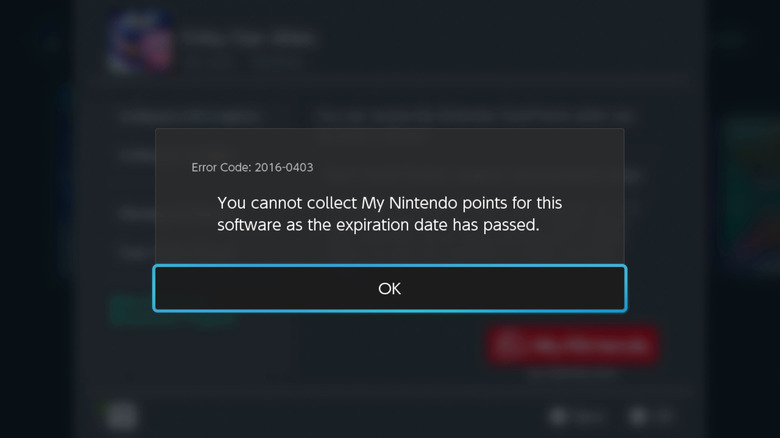Nintendo Switch: Everything You Should Know About Gold And Platinum Points
In terms of hardware, software, and ecosystem, Nintendo often has a penchant for operating very differently from the competition. As such, casual consumers may be surprised to learn that the gaming juggernaut has a decidedly robust rewards program not too dissimilar from the ones offered on platforms like Steam, PlayStation, or Xbox. The service, My Nintendo, was born from the ashes of Club Nintendo back during the Nintendo 3DS and Wii U era, and it's still going strong today with the Nintendo Switch.
Players can use My Nintendo's rewards program to save money on Nintendo Switch games and even obtain official physical and digital memorabilia. However, doing so requires a fundamental understanding of the program's main two currencies: Gold Points and Platinum Points. With that in mind, here's an overview of how exactly they work, what the differences are between the two, how to earn and redeem them, and how long users can hang onto them before they expire.
What are Gold and Platinum Points?
While Gold and Platinum Points are both what drive the My Nintendo rewards program, they have very different uses. Gold Points are generally earned through the purchase and activation of new games, and are primarily used with the Nintendo eShop. Each individual Gold Point has a value of $0.01, and they can be used to help pay for digital games on the eShop.
Unlike Gold Points, Platinum Points aren't generally used for game discounts and don't have any sort of functionality with the eShop. They can be earned through a variety of means, both directly through the Switch and on other devices like PC and mobile phones. In turn, Platinum Points can be spent on several different things, including My Nintendo-exclusive rewards and accessories, and customizability features for a user's Switch profile.
Users who access the My Nintendo portal may notice that several game-specific variations of Platinum Points exist in addition to the general currency: Platinum Points for "Animal Crossing: Pocket Camp," "Super Mario Run," and "Fire Emblem Heroes." As their names and branding imply, these points are solely for use with Nintendo's mobile game offerings and have no compatibility with the Switch ecosystem.
How to earn Gold and Platinum Points
Nintendo Switch users can earn Gold Points by purchasing and activating games, though the guidelines are a bit different based on whether the user has bought a physical or a digital copy. Players can obtain one Gold Point per real-world dollar of the MSRP of a physical game. For example, "Super Mario Bros. Wonder" has a suggested retail price of $59.99, and a physical copy will award 60 Gold Points. Digital versions of games offer a comparatively more substantial 5% rate, with a $59.99 game typically granting 300 Gold Points.
In order to earn Gold Points for physical games, users must access the game's software settings by pressing the + button while hovering over the game's home screen icon and then select the option to earn Gold Points under the My Nintendo Rewards Program tab. This process is automated for digital game purchases.
Users can earn Platinum Points through a variety of methods, including through the Switch itself. The worthwhile Nintendo Switch Online application on the Switch home screen regularly features an updating list of Missions, each of which will offer a sum of Platinum Points upon completion. Missions can range from playing a specific NES game through Nintendo Switch Online, to backing up save data for a certain game.
The My Nintendo internet hub also features ways to earn Platinum Points. In addition to a weekly sign-in bonus, users can earn additional points through a separate list of Missions designed for web access.
What can Gold and Platinum Points be spent on?
Gold Points are solely used for discounts on the Switch eShop. When a user is on the payment screen for a digital Switch game, they have the option to convert either a portion or the entirety of their Gold Points into real-world currency that can then be put towards buying software. For instance, a user with 500 Gold Points saved up can redeem them all for $5.00 off of their payment.
It's worth noting that users will only receive new Gold Points from a digital purchase based on the amount of money they spent after subtracting the amount paid for by Gold Points. Simply put, a Nintendo Switch game bought completely for free through the use of Gold Points will not award the purchaser any new Gold Points.
As for Platinum Points, this currency can be redeemed through the Nintendo Switch Online application for a rotating selection of user profile icon elements based on various Nintendo games and franchises. The My Nintendo internet hub offers even more options to redeem Platinum Points for, including physical merchandise. The inventory of the shop varies with time, but the service routinely offers items such as sticker sheets, pins, posters, and PC/phone wallpapers, all based around various Nintendo properties.
When do Gold and Platinum Points expire?
While it may seem tempting for Switch owners to hoard Gold Points and Platinum Points until they have enough to splurge on some massive purchases, that may not always be the best strategy, because there are strict regulations with regard to expiration dates.
For one thing, users can only earn Gold Points for each physical Nintendo Switch game up to one year after its original release date. If a player does not press the button to redeem Gold Points on their personal copy of a game within a year of the game's release, the associated points will expire. It also means older Switch games, such as "Super Mario Odyssey," are no longer eligible for earning Gold Points, even if the user has purchased a new copy of the game. Fortunately, these restrictions don't exist for any game purchased digitally on the eShop, regardless of release date.
Once a user has earned any new sum of Gold Points, they have roughly one year to redeem them before they expire. The longevity of Platinum Points is even more brief, as users only have six months. On the My Nintendo Point summary page, users are able to see whether any of their points are due to expire (and how many, if so) within the next six months. Generally speaking, the system encourages consumers to use their Gold Points and Platinum Points on a consistent basis, rather than saving them up for extended periods of time.
